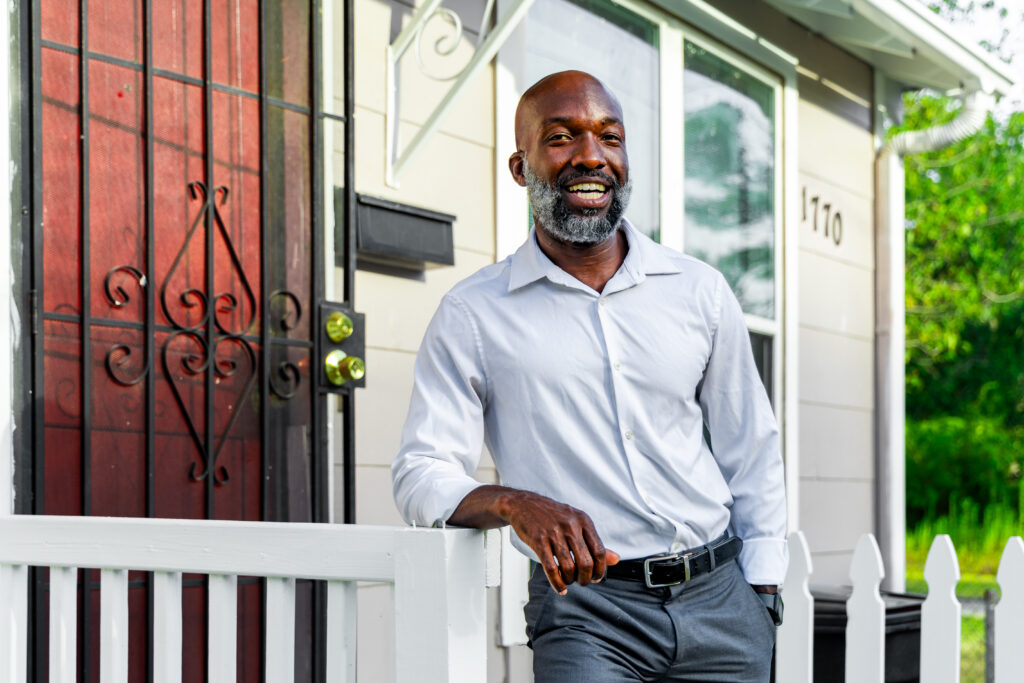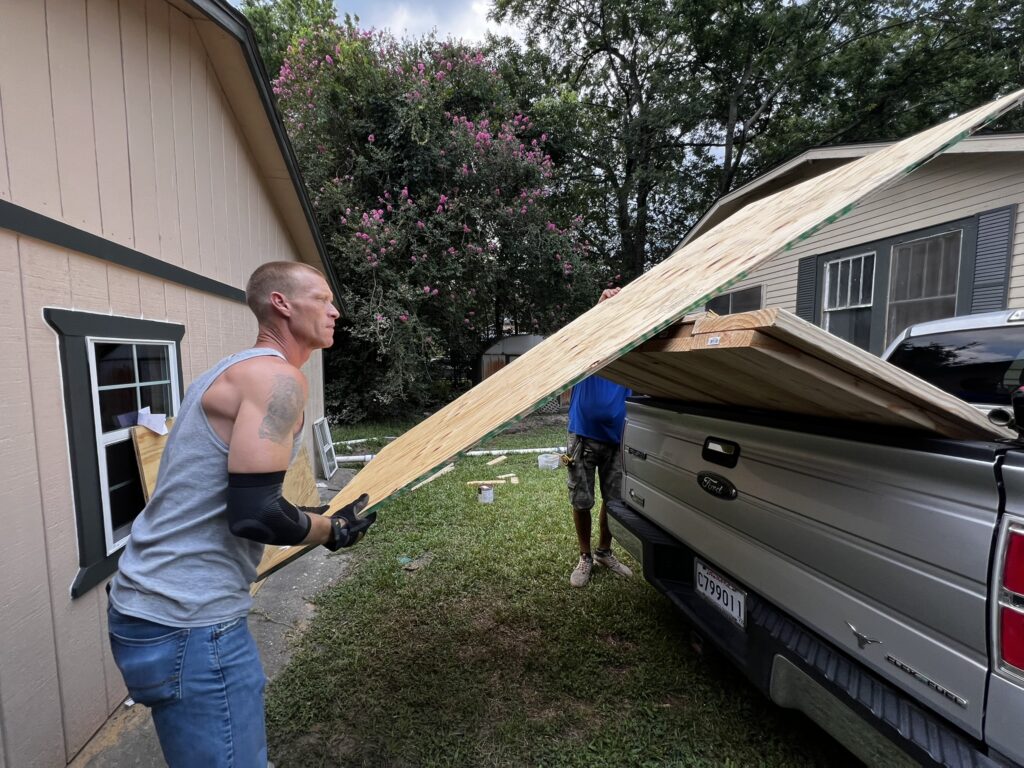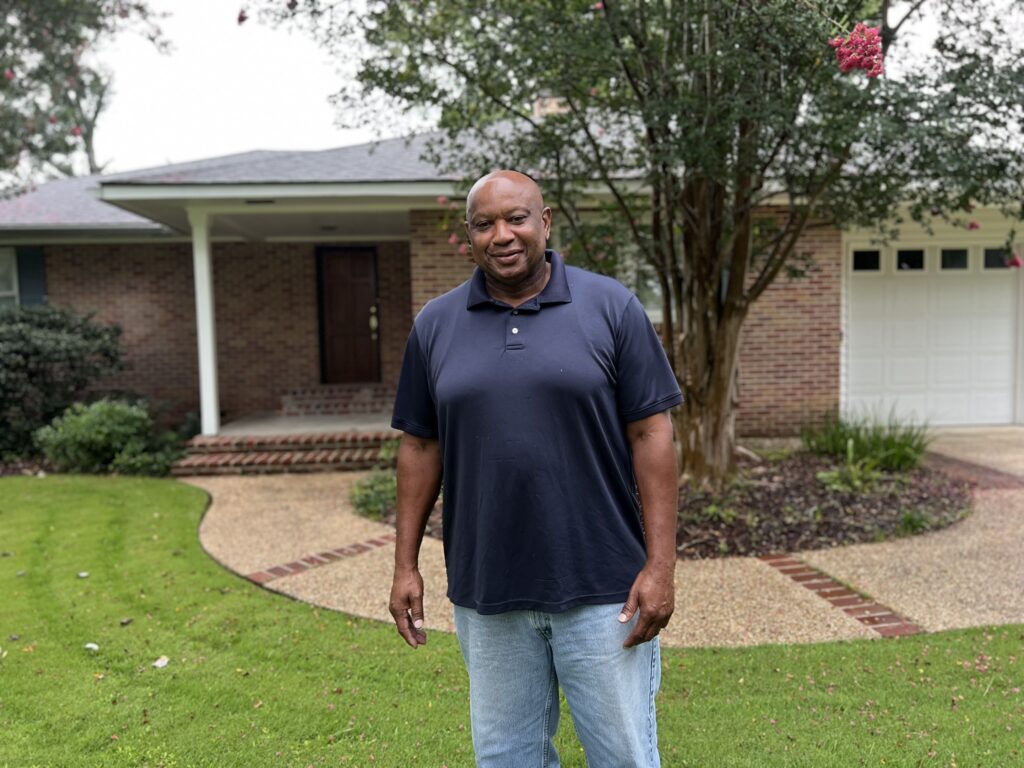Last fall, Clarence stepped into freedom after incarceration with one guiding vision – a place to call his own. Now, he’s just one month away from unlocking the door to that dream.
In August, Clarence will close on a two-bedroom, one-bathroom home in the heart of Baton Rouge, and he credits Parole Project for helping him reach his goal.
“They have been so helpful,” said Clarence, a veteran who grew up in Gonzales. “It’s like riding a bike with the training wheels on and that’s what they were – my training wheels. They have helped me strive for my goals, and now my training wheels are off and I’m riding that bike. I have a great job, I’m back in school, my relationships have been restored, and I’m buying a home, and that’s because of the tremendous support through Parole Project.”
“Stable housing is one of the most critical factors in ensuring successful reintegration for people after incarceration,” said Andrew Hundley, Parole Project’s executive director. “Without a safe and reliable place to live, the path to sustainability, which includes finding employment, reconnecting with family and achieving prosperity, becomes significantly more difficult.”
That’s why housing is central to Parole Project’s mission. Parole Project currently owns and operates 42 residences that provide safe shelter for more than 70 people returning from prison. Clarence found his footing in one of these homes and on Aug. 12, he will move into his own 1,500-square-foot home with a beautifully landscaped yard purchased through a VA loan and made possible by the foundation Parole Project helped him build.
“We are removing barriers and providing opportunities for people to be successful,” Hundley said. “The more opportunities, the greater the chance of success will be. We give people safe places to live to rebuild their lives.”

In 2019, Parole Project acquired its first three homes thanks to a pivotal grant from The Sunshine Lady Foundation, a North Carolina-based nonprofit established in 1966 by the late Doris Buffett, sister of Warren Buffett. That initial investment became the foundation for growth, enabling Parole Project to steadily purchase additional homes each year.
“Having access to affordable, reliable, safe housing is critical to people who are trying to reenter and reintegrate into society after prison,” said Don Allison, vice president of Parole Project’s the board of directors. “That’s the reason we have made housing for these individuals a top priority. We are proud of our success in this area, and we plan to continue providing our clients with dependable, accessible, and secure housing in the future.”
Parole Project not only acquires properties to provide safe, affordable housing for its clients – it also leverages the expertise of formerly incarcerated staff members certified in trades like HVAC, electrical, carpentry, and plumbing. Many of these skills were earned during incarceration and now fuel a self-sustaining system of maintenance and care. By utilizing in-house talent, Parole Project keeps labor costs low while empowering staff to contribute meaningfully to community restoration.
“Because our organization wants to see stability in our homes and because they are an investment, we want to be able to buy them and manage them with the resources we have,” Hundley said.
Barriers to housing remain prevalent. Formerly incarcerated individuals often face discrimination in rental applications, restrictive policies on public housing eligibility, and financial challenges due to gaps in employment during incarceration. These obstacles create an environment where many are forced into unstable living conditions, or homelessness, increasing the risk of returning to the criminal justice system.
Parole Project provides two types of supportive housing: transitional and post-transitional. Transitional housing is provided free of charge to clients during their first phase of their reentry journey, giving them a stable foundation as they begin life beyond incarceration. During this time, dedicated reentry specialists help clients navigate their reentry journey – providing transportation to appointments and classes and offering one-on-one coaching and mentorship support.
For the first four to six weeks of being home, clients attend in-person classes at Parole Project’s offices – spaces designed to nurture growth and confidence. These sessions equip individuals with practical tools and emotional insight to rebuild their lives with intention. The curriculum spans financial literacy and budgeting, navigating everyday social norms, responsible use of social media, and developing core employment skills essential for a successful reentry.

For clients who complete their reentry classes and lack long-term housing support, they can remain in transitional housing while securing employment and becoming financially stable. Eventually clients begin contributing rent to help off-set the cost of utilities. After that, clients have two options: moving into their own apartment or home or moving to Parole Project’s post-transitional housing at a below-market rate.
While Clarence was incarcerated, he spent time at Angola through East Baton Rouge Parish’s Reentry Court program, where he received trade certifications in heating and air conditioning. He was happy to have Parole Project’s housing support while he focused on himself, completing the classes, and securing employment.
“When I got out, Parole Project taught me the ABC’s of a job. First, get A job, then get a Better job, and a Career,” Clarence said. “They not only provided me with a safe place to live but set up some things for me, too.”
Clarence attends ITT Technical College in the evening and has a steady day job, managing all the cooling and heating units at a large apartment complex in Baton Rouge.
Access to housing provides more than just a roof for Clarence and other clients at Parole Project, it also offers stability, dignity, and a foundation for personal growth. Investing in housing tailored to those transitioning out of incarceration is not only beneficial for the individual – it strengthens communities as a whole. Programs that offer transitional housing, supportive services, and rental assistance reduce homelessness, improve public safety, and contribute to long-term economic stability.
“I never thought I would be a homeowner in a year,” said Clarence. “I know it was my goal but to see it coming true is an amazing feat. Coming out of prison, I didn’t have anywhere to go and Parole Project not only gave me a foundation but held me accountable and taught me how to save my money. They are truly a blessing.”




